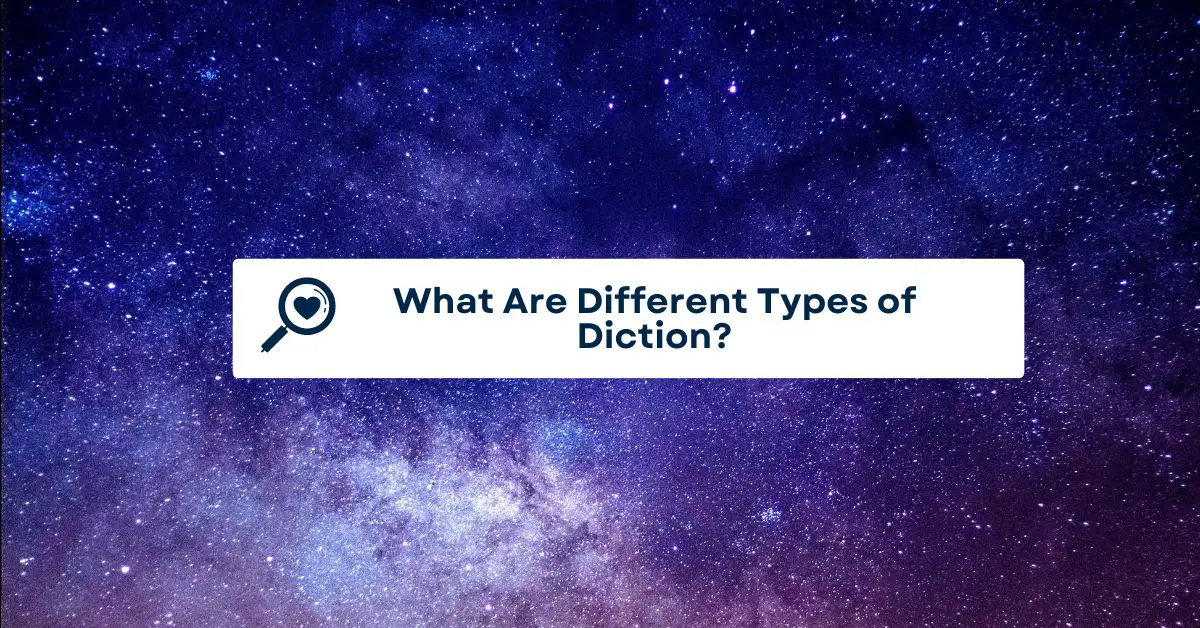Etymology and Meanings of Diction
The word “diction” comes from the Latin word “dictionem,” which means “expression” or “utterance.” In modern English, diction refers to the choice and use of words in speech or writing. It is an aspect of language that can affect the clarity, precision, and effectiveness of communication. Diction can also refer to the style and tone of language and the accent or pronunciation of words.
Definition of Diction
Diction, in literary terms, refers to the specific words and writing style chosen by an author. It is the language that allows a writer to have their own unique style and voice in their writing.
Types of Diction
- Formal diction refers to sophisticated and technical language. It is typically used in formal or academic settings and can be found in written texts such as research papers or legal documents.
- Informal diction is characterized by casual and colloquial language. It is commonly used in everyday conversation and can be found in texts such as messages or casual conversations.
- Archaic diction is characterized by using outdated and obsolete language. It is often used in literature to give a sense of historical context or to convey a sense of old-fashionedness.
- Slang diction is characterized by using informal language specific to a particular group or culture. It is often used in casual conversations and can be found in text messages or casual conversations.
- Jargon diction is characterized by technical language specific to a particular field or profession. It is often used in professional settings and can be found in texts such as research papers or industry-specific documents.
Literary Examples of Diction
- In To Kill a Mockingbird by Harper Lee, the character Atticus Finch uses formal, precise diction when speaking to his children: “Mockingbirds don’t do one thing but make music for us to enjoy. They don’t eat up people’s gardens or nest in corncribs; they don’t do anything but sing their hearts out for us. That’s why it’s a sin to kill a mockingbird.”
- In The Great Gatsby by F. Scott Fitzgerald, the character Tom Buchanan uses rough, colloquial diction when speaking to his mistress: “I’ve been everywhere and seen everything and done everything. Sophisticated – hell, I’m sophisticated.”
- In the novel Pride and Prejudice by Jane Austen, Mr. Darcy uses formal, proper diction when speaking to his friend: “My good opinion, once lost, is lost forever.”
- In the novel Moby-Dick by Herman Melville, the character Ishmael uses descriptive, literary diction when describing the sea: “The sea is a prodigious monster, the mine of an infinite treasure of gold and silver, the vast storehouse of all that the earth contains; but it is also the graveyard of the human race.”
How to Create Diction
When constructing a particular language style or tone in writing, it is crucial to consider the following factors:
- The identity of the writer
- The intended audience
- The desired outcome or purpose of the writing
- The context or setting in which the language will be used
This is why technical writing professionals always gather information about the writer’s background, the audience’s demographics, the specific goals of the piece, and the specific circumstances in which the language will be employed.
Benefits of Using Diction
- By choosing effective diction, the writers eliminate confusion and ensure that the intended meaning is accurately conveyed to the audience.
- Similarly, the use of varied and sophisticated diction can add depth and interest to writing, creating a more engaging and aesthetically pleasing experience for the reader.
- Careful use of diction can help to establish the speaker or writer as an expert in their field, giving their words more weight and credibility.
- Words can have a powerful emotional impact on readers or listeners, and the choice of specific words can help to evoke strong feelings and reactions in the audience.
- By using words that are familiar and easily understood by the audience, diction can help to facilitate better understanding and comprehension of the message being conveyed.
Suggested Readings

